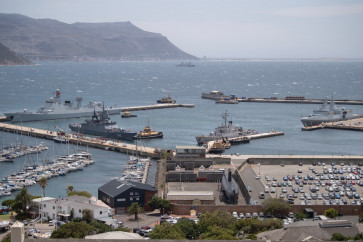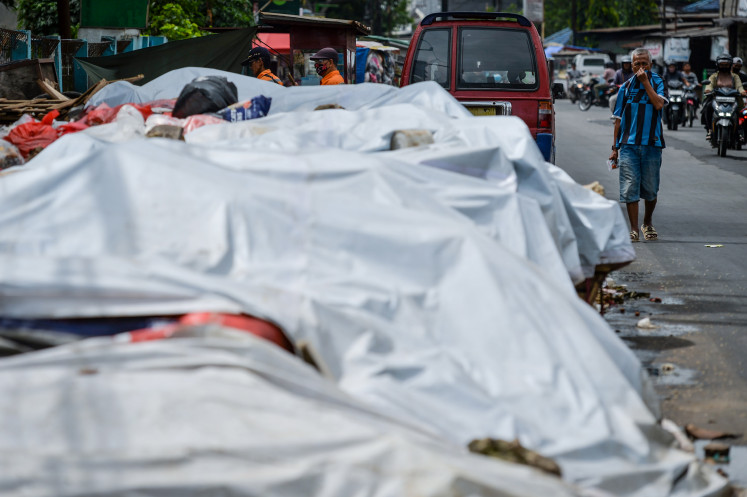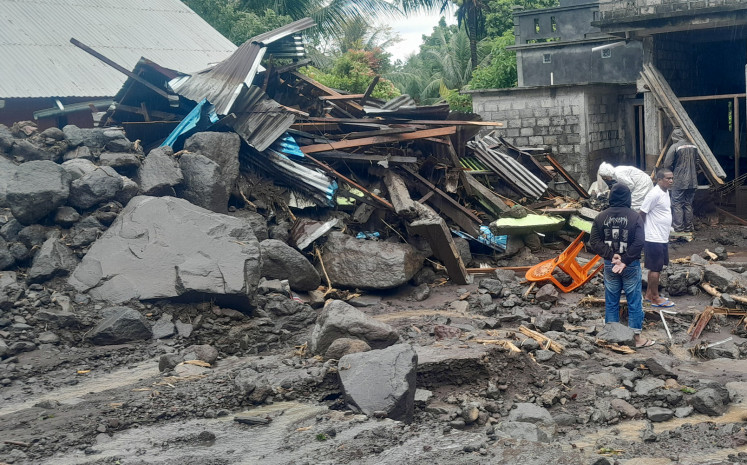Popular Reads
Top Results
Can't find what you're looking for?
View all search resultsPopular Reads
Top Results
Can't find what you're looking for?
View all search resultsWatch and wonder: How stupid are we?
Pete Postlethwaite appears in the documentary as an archivist in the future, looking back at footage from the past — that is, of now, the Age of Stupid
Change text size
Gift Premium Articles
to Anyone
P
span class="caption" style="width: 396px;">Pete Postlethwaite appears in the documentary as an archivist in the future, looking back at footage from the past — that is, of now, the Age of Stupid. Courtesy of Spanner Films
After the recent screening of The Age of Stupid, an indie film with a novel approach to environmental documentary, some of the audience lingered for some climate change chit-chat, pondering the pros and cons of doomsday messaging.
Chicken Little meets appreciative inquiry - whom should we back at this historic moment?
Green Radio, Greenpeace and other co-hosts managed to attract about 120 filmgoers to an English-language film with Indonesian subtitles that deserves far wider distribution here. The 30-odd diehards who stayed after the end were cheered up when co-host Green Radio gave away the door prize, a bicycle designed and produced here in Indonesia. The winner was only a bit appreciative - how to get it home on his motorbike?
If you sit down with a Greenpeace activist, a social scientist and a handful of people active in climate change issues, you'll find the tenor of the discussion to be desperate optimism. What's the right way to engage people with the realities of climate change post-Kyoto, post-Inconvenient Truth, and just barely pre-Copenhagen?
But first the film.
Director Franny Armstrong gives us a creative montage of animation, straight-up documentary and sci-fi film traditions to tell a pressing story in real terms we can all understand. Pete Postlethwaite plays the last man on earth, recording his final testimonial in the archive of all human achievement, somewhere 100 miles north of Norway in the post-apocalyptic future. (Which is not so futuristic given global futurists have already set up the Seed Bank in Spitsbergen.)
The four documentaries interwoven through the film offset the dark oblivion of The End, focusing on four real people doing real things to fight the climate change dilemma humans have created. Windmill makers, mountain guides, subsistence farmers are all living within the new "climate code".
The scene stealer is 82-year-old mountain dweller Fernand Pareau, who takes us on an awe-inspiring climb into a recently exposed glacier in the Alps. If a picture is worth a thousand words, then his backyard tells us that this world is not about us.
Piers Guy's story is about his neighbors, incredibly narrow-minded though seemingly intelligent Britons, who think windmills are ugly and refuse to let him throw up a few in their delicious little corner of Cornwall. It shows the practical side - that real decisions take place in town council and zoning meetings in local communities, not in Oxfam offices. We understand the high barriers to accepting the new climate code in ordinary places.
The fi lm uses animation to show parts of the world, such as the Taj Mahal, in the future. Courtesy of Spanner Films
The high-quality animation and effects in the film, its futuristic, creative angle for presenting news clip after news clip, weaving a story together the way we all surf these days - it's all clever enough to make us realize that Al Gore's Inconvenient Truth is just a nerdy dressed up slide show (sorry, Al).
That high-quality and new version comes from the new production mechanism. The film was crowd-financed with social networking techniques (thanks, Barack), with everyone who contributes getting a share in the film (psst - pitch in at www.ageofstupid.net/money).
If the new media are going to make a difference, then this film's message is its way of coming into being and can give us real hope that media and messages can cut through complaisance.
Just another word on technique. Anyone admiring the twisted genius of Terry Gilliam, even if you work for Exxon, will adore this film. The filmmakers let animation director Jonathan Hodgson romp across the screen with multitudes of facts and figures in cardboard cutouts. Special kudos for representing the scale of the issue and the forces at play with "lo's o' li'l bits".
So here's the debate: do we talk about climate change and get everyone engaged by talking about the possibilities, about what can be? Show me a movie about how climate change got reduced and we keep our temperature at about 2 degrees Celsius more than pre-industrial levels. Show me people living without oil in large groups, not the isolated Manhattanite writing a book or wind-farm advocates pretending to be just another regular family in the Cotswolds.
Or do we say, "not enough, not nearly enough" and start raising some ruckus because, despite all the talk, the burning continues while millions of Asians are just beginning to get the chance to say, "I want to get me some of that energy age lifestyle, thank you very much. Just give India a couple of years of pleasure and then we'll turn liberal too."
The Age of Stupid will be screened again in Indonesia on Dec. 4. Details will be announced at www.ageofstupid.net/screenings/cinemas/2017
Quotes from The Age of Stupid
The Archivist (Pete Postlethwaite): "We could have saved ourselves, but we didn't. It's amazing. What state of mind were we in, to face extinction and simply shrug it off?"
Alvin DuVernay (Shell paleontologist and hero of Hurricane Katrina): "In my opinion our use or misuse of resources the last 100 years or so, I'd probably rename that age, something like The Age of Ignorance, The Age of Stupid."
Fernand Pareau (French mountain guide): "When you're in the mountains you're roped together. The risk is the same for you as it is for me."
Piers Guy (UK wind-farm developer): "How the heck are we meant to persuade people in India and China to develop in a more sustainable way when we're not even prepared to accept the odd wind-farm in the landscape?"











